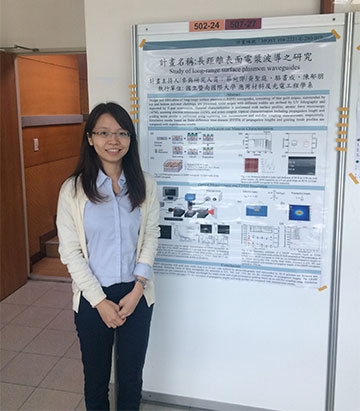
Wan-Shao Tsai
In this installment of Senior Member Insights, OPN talks with Wan-Shao Tsai, an associate professor with the Graduate Institute of Optoelectronic Engineering, National Chung Hsing University, Taichung, Taiwan. Tsai received her B.S. degree in electrical engineering and a Ph.D. degree in electronics engineering from National Taiwan University, Taipei, Taiwan, in 2002 and 2008, respectively.
In 2007, Tsai spent one year at RWTH Aachen University in Germany as a visiting scholar. From 2008 to 2019, she was with the Department of Applied Materials and Optoelectronic Engineering, National Chi Nan University, Nantou, Taiwan. Her research interests focus on the design and implementation of optical measurement systems for the characterization of integrated photonic and plasmonic devices.
What first interested you in pursuing science?
I loved both science and literature in my youth. I read a lot of whatever interested me. I began pursuing science when I took physics courses in high school, and I have decided to work on something related to physical sciences since then. The fascination with light attracted me as I was introduced to the area of electromagnetic waves in undergraduate studies. The diverse appearances of light impress me so much that I want to know more about it. The curiosity [about] light brings me to where I am now.
What aspect of your current work do you find the most interesting or exciting?
Attending international conferences and meeting with scholars from all over the world make me feel excited. I can always find some inspiring research works there. Apart from this, I enjoy concentrating on experiments in the optics laboratory. Solving problems with my students brings me a great sense of achievement. Giving lectures to undergraduate/graduate students can be rewarding when some shiny eyes are under the stage.
What tips for successful networking do you have for early-career professionals?
A good mentor is very helpful and encouraging in the early-career stage. Personally, I take advice from senior colleagues and interact with them. Learning from experienced colleagues broadens my views in the field. Attending international conferences annually and staying engaged with technical and social programs is also very important. No matter [whether they are] large conferences or small workshops, there will always be good chances to meet potential collaborators around the world.
What professional resources do you rely on to stay active and engaged with your field?
Journal subscriptions are definitely a key resource for me. I enjoy reading scientific magazines such as OPN for highlighted research findings. Attending an on-site conference with the presentation of important works is inspiring. In addition to this, I attend webinars as often as I can. Especially during the pandemic, virtual conferences and webinar talks are quite helpful. Some of them provide post-recorded videos, which benefit people who cannot attend the talk in time.
What’s the best career decision you’ve ever made, and why?
I decided to visit RWTH Aachen University in Germany in the last year of my Ph.D. study. It turns out that was one of the best decisions in my career. Besides the solid professional training, different culture, and unforgettable life experiences, the most important thing I learned is to view and think from different perspectives. This helps me a lot in my ongoing career when solving difficult issues and multitasking.
Describe a major turning point in your career. Was there a specific action/accomplishment that got you there?
The major turning point in my career was when I decided to relocate to my current university, which provides a diverse and dynamic environment. It is a reset process. I have to build up a new laboratory, recruit new members, and prepare for new lectures. Life becomes more challenging but more fulfilling. I believe that building up a pyramid rather than climbing up a ladder means much for me. I keep this in mind so that I can make small progress and enjoy the process every day.
What is one piece of advice that you wish you were given as a student/early in your career?
Be confident and focus on your own choice. Be curious and determined in exploring research directions. Do not be afraid to ask questions. Talk to someone when you get lost on the road. Try to find the balance between work and life.
How important are leadership roles in career development, and how do you hone your leadership skills?
I think leadership is extremely important in career development, because one will ultimately be in charge of some important duty. My advice is to learn from others no matter what position you are in now. For myself, I learn from my colleagues how they manage their group, and I volunteer in the institutional affairs or conference organization so that I can learn from these experiences. I also read advice from women leaders, which helps me a lot in building up my confidence and realizing potential difficulties so that I can prepare in advance.
At this point in your career, what are you most looking forward to next?
Two years ago, I joined my current university and took the challenge to restart my laboratory. At this moment, I am most looking forward to building up my group with strong academic and industrial connections.
If you weren’t in the sciences, what would be your dream career?
I think I would be an artist. In my childhood, I often visited neighboring art museums and spent a lot of time there. I enjoyed reading books in arts, photography and architecture on the bookshelves. When I grew up, I loved all the handmade things. Chinese and western paintings are also very appealing to me. Nowadays, I still carry my portable painting tools with me to fill blank postcards with the scenery I see when traveling around.
